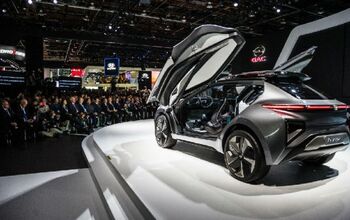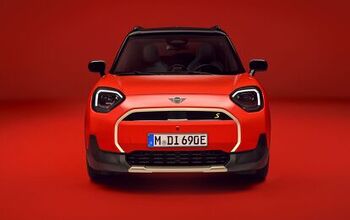The Detroit Auto Show: And the Band Plays On
I don't want to be the one to throw cold water on Detroit's billion dollar beauty pageant, but someone's got to do it. The workers' demonstration outside Cobo Center turned out to be a damp squib (probably because the workers in question enjoy a union contract that guarantees them job security, a comfortable salary and comprehensive health care). The mainstream automotive press isn't about to bite the hand that RSS feeds. So I'll step into the breach with a simple statement: the last thing Detroit needs right now is a bunch of new cars.
Once upon a time, the Detroit auto show was The Detroit Auto Show, not some gussied-up international flying circus. Carmakers showed off wild, inherently stupid concept cars that would never, EVER be built and the latest update to their showroom models. And then everyone headed off to open bars and hooker-laden hospitality suites to do what comes natural to middle-aged white men. Now the suits are serious and the web is alive with the sound of clickery, as even industry addicts struggle to keep up with dozens of new models headed for the showrooms. While it's easy to get caught up in the buzz, I'm here to say that all this product overkill will, as the Brits say, end in tears.
Of course, niche marketing mania already has a lot of shareholders crying– should anyone be bothered to notice. GM and Ford have wiped off tens of billions from shareholder value in the last year alone, and yet everyone is happy to believe that spending hundreds of millions of dollars building and showing off a fantastic over-abundance of new products is a sign of corporate health and hope. Even Daimler-Chrysler-Mercedes-Dodge-not-so-SMART, a company that missed a date with the executioner by the skin of the [Hail Mary] 300C, is happy to move with the gluttony-as-God groove. Detroit's submersion under a red ink tsunami ought to tell folks in no uncertain terms that this "car of the minute" shotgun approach is an abject failure, even if Detroit's titanic deck party says otherwise.
While GM unveils the latest Buick van (a vehicle that should have been called "Last Days in the Bunker" instead of "Enclave") and declares a corner turned for a dead brand waiting, Toyota reveals a refreshed sixth gen Camry with a hybrid engine option, and keeps grinding the competition into the dust. The makers of America's best-selling sedan (for the last four year's running) "get it": you sweat blood and spend billions to get customers into a new vehicle, and then you sweat blood and spend billions to bloody well keep them there. Lexus' updated eight-speed LS technobarge will keep their customers away from Mercedes dealers. Infiniti's non-radical G35 concept car and tweaked FX and M models will do the same.
The Big Three are neglecting their core models in favor of entirely new models that look like nothing else in their portfolio (e.g. the Lincoln MKX). While the Japanese are not adverse to growing and selling a bit of strange fruit from time to time, they refine and refine and refine their existing best-sellers, minting money and growing market share. Screw GM's new crossovers, how's the new Impala and big Caddy? Forget about the Ford Edge, how's the new Lincoln LS– I'm sorry, Five Hundred? Crap, really. Nothing but a big soft target for rival automakers coveting their audience. The fact that Ford and GM's "new" SUV's won't offer a world-class hybrid powerplant for another year is nothing less than a disgrace.
A while back, the "ten day car" was the talk of Cobo Township. The idea: build a customized version of a mainstream model and deliver it to the buyer in ten days. At an auto show conference, consultant Michael Robinet declared the concept dead. At the same time, The Vice President of CSM Worldwide acknowledged that dealer profits are increasingly dependent on aftermarket conversions. Hel-lo? As the increasing number and sophistication of Camry options indicates, the ten day car concept is far from dead. And money, like energy, is never lost; it just changes form. The dealer profits are a clear indication that mass customization IS the future– not the explosion of new models. In fact, its realization could help save Detroit's automakers from oblivion, maintaining what little customer loyalty remains.
Think about it. Check the history of the sales charts, where the same models appear again and again. That's because the vast majority customers don't want a NEW car. They want a BETTER car. As you can plainly see at The North American International Clusteryouknowwhat, Detroit seems resolutely determined not to give it to them. So party on guys. A reckoning is on its way.
More by Robert Farago
Latest Car Reviews
Read moreLatest Product Reviews
Read moreRecent Comments
- Jalop1991 In a manner similar to PHEV being the correct answer, I declare RPVs to be the correct answer here.We're doing it with certain aircraft; why not with cars on the ground, using hardware and tools like Telsa's "FSD" or GM's "SuperCruise" as the base?Take the local Uber driver out of the car, and put him in a professional centralized environment from where he drives me around. The system and the individual car can have awareness as well as gates, but he's responsible for the driving.Put the tech into my car, and let me buy it as needed. I need someone else to drive me home; hit the button and voila, I've hired a driver for the moment. I don't want to drive 11 hours to my vacation spot; hire the remote pilot for that. When I get there, I have my car and he's still at his normal location, piloting cars for other people.The system would allow for driver rest period, like what's required for truckers, so I might end up with multiple people driving me to the coast. I don't care. And they don't have to be physically with me, therefore they can be way cheaper.Charge taxi-type per-mile rates. For long drives, offer per-trip rates. Offer subscriptions, including miles/hours. Whatever.(And for grins, dress the remote pilots all as Johnnie.)Start this out with big rigs. Take the trucker away from the long haul driving, and let him be there for emergencies and the short haul parts of the trip.And in a manner similar to PHEVs being discredited, I fully expect to be razzed for this brilliant idea (not unlike how Alan Kay wasn't recognized until many many years later for his Dynabook vision).
- B-BodyBuick84 Not afraid of AV's as I highly doubt they will ever be %100 viable for our roads. Stop-and-go downtown city or rush hour highway traffic? I can see that, but otherwise there's simply too many variables. Bad weather conditions, faded road lines or markings, reflective surfaces with glare, etc. There's also the issue of cultural norms. About a decade ago there was actually an online test called 'The Morality Machine' one could do online where you were in control of an AV and choose what action to take when a crash was inevitable. I think something like 2.5 million people across the world participated? For example, do you hit and most likely kill the elderly couple strolling across the crosswalk or crash the vehicle into a cement barrier and almost certainly cause the death of the vehicle occupants? What if it's a parent and child? In N. America 98% of people choose to hit the elderly couple and save themselves while in Asia, the exact opposite happened where 98% choose to hit the parent and child. Why? Cultural differences. Asia puts a lot of emphasis on respecting their elderly while N. America has a culture of 'save/ protect the children'. Are these AV's going to respect that culture? Is a VW Jetta or Buick Envision AV going to have different programming depending on whether it's sold in Canada or Taiwan? how's that going to effect legislation and legal battles when a crash inevitibly does happen? These are the true barriers to mass AV adoption, and in the 10 years since that test came out, there has been zero answers or progress on this matter. So no, I'm not afraid of AV's simply because with the exception of a few specific situations, most avenues are going to prove to be a dead-end for automakers.
- Mike Bradley Autonomous cars were developed in Silicon Valley. For new products there, the standard business plan is to put a barely-functioning product on the market right away and wait for the early-adopter customers to find the flaws. That's exactly what's happened. Detroit's plan is pretty much the opposite, but Detroit isn't developing this product. That's why dealers, for instance, haven't been trained in the cars.
- Dartman https://apnews.com/article/artificial-intelligence-fighter-jets-air-force-6a1100c96a73ca9b7f41cbd6a2753fdaAutonomous/Ai is here now. The question is implementation and acceptance.
- FreedMike If Dodge were smart - and I don't think they are - they'd spend their money refreshing and reworking the Durango (which I think is entering model year 3,221), versus going down the same "stuff 'em full of motor and give 'em cool new paint options" path. That's the approach they used with the Charger and Challenger, and both those models are dead. The Durango is still a strong product in a strong market; why not keep it fresher?


































Comments
Join the conversation